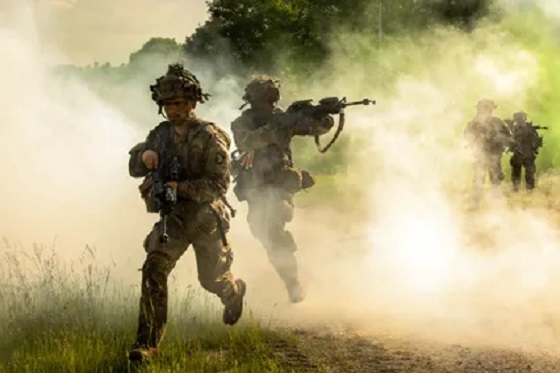armed forces
Canada’s Military is Collapsing. Without Urgent Action, We Won’t Be Able To Defend Ourselves

From the Frontier Centre for Public Policy
By David Leis
Decades of underfunding and political neglect have left our military weak and unprepared
What Lt.-Gen (retired) Michel Maisonneuve (ret.) told me about Canada’s military was nothing short of alarming. He didn’t mince words—our armed forces are in dire straits. If we don’t act now, Canada will not only be unable to defend itself, but it will cease to be taken seriously by our allies, many of whom are already losing patience with our military decline.
Maisonneuve has seen firsthand what a functioning military looks like. He has served at the highest levels, working alongside our allies in NATO, and he knows exactly what Canada is failing to do. “We are no longer at the table when major defence decisions are made,” he told me. “The Americans don’t ask us what we think anymore because they know we can’t contribute.” That is a stunning indictment of where we now stand—a country that was once respected for its ability to punch above its weight militarily has been reduced to an afterthought.
The problem, as Maisonneuve laid out, is both simple and staggering: Canada doesn’t take its defence seriously anymore. The government has allowed our forces to wither. The Air Force is still buying CF-18s from the 1980s because the long-delayed F-35 procurement is years behind schedule. The Navy, once a competent maritime force, is barely functional, with no operational submarines and a fleet that is nowhere near what is needed to patrol our vast coastlines.
Meanwhile, the Army is struggling to recruit and retain soldiers, leaving its numbers dangerously low. “We have an Army in name only,” Maisonneuve said. “If we were called upon tomorrow to deploy a fully operational combat force, we couldn’t do it.”
Even more shocking is the state of readiness of our troops. A recent report found that 75 per cent of Canadian military personnel are overweight. Maisonneuve didn’t sugarcoat it:
“It’s unacceptable. We are supposed to be training warriors, not watching fitness standards collapse.” When the people entrusted with defending our country are struggling with basic physical fitness, it speaks to something much deeper—an institutional rot that has infected the entire system. Our allies have noticed. Canada was locked out of AUKUS, the military alliance between the U.S., the U.K. and Australia. “It wasn’t an oversight,” Maisonneuve explained. “It was a deliberate snub. The Americans don’t see us as a serious defence partner anymore.” That snub should have been a wake-up call. Instead, our government shrugged it off.
Meanwhile, Washington is openly questioning Canada’s value in NATO. The Americans see the numbers—Canada refuses to meet even the minimum defence spending requirement of two per cent of GDP. Instead of fulfilling our obligations, we offer up empty promises and expect others to pick up the slack.
Maisonneuve is blunt about what needs to be done. “First, we need to fully fund the military—and that means not just hitting the NATO target but exceeding it. Our allies spend real money on their defence because they understand that security is not optional.” He suggests Canada should aim for at least 2.5 per cent of GDP, not just as a show of commitment but as a necessity to rebuild our capabilities. Beyond money, Maisonneuve argues that military culture must be restored.
“We’ve allowed ideology to creep into the ranks. The military’s primary function is to defend the nation, not to serve as a social experiment,” he said. “We need to get back to training warriors, not worrying about whether we’re ticking the right diversity boxes.” He believes a return to a warrior ethos is essential— without it, the military will remain directionless.
Procurement is another disaster that Maisonneuve insists must be fixed immediately. “We’ve spent years dithering on replacing equipment, and every delay puts us further behind,” he said. The F-35 deal should have been signed years ago, but political hesitation means we won’t see a full fleet for years. The Navy urgently needs new submarines and icebreakers, especially to secure the Arctic, where other global powers, particularly Russia, are ramping up their presence.
The biggest issue, though, is manpower. “We need to rebuild the forces, period,” Maisonneuve told me. “That means recruiting, training, and retaining soldiers, and we are failing at all three.” He even suggested that Canada should consider implementing a national service requirement, a move that would not only increase troop numbers but also instill a sense of duty and responsibility in younger generations. “We used to be a country that took security seriously,” he said. “What happened?”
That’s the question, isn’t it? What happened to Canada? How did we go from being a country that contributed meaningfully to global security to one that can’t even defend itself? The reality is that successive governments have let this happen—first by neglecting funding, then by letting bureaucracy suffocate procurement, and finally by allowing the core purpose of the military to be diluted.
Maisonneuve is clear: Canada must act now, or it will cease to be taken seriously.
David Leis is President and CEO of the Frontier Centre for Public Policy and host of the Leaders on the Frontier podcast
armed forces
Trump rebuilds the ranks: Army crushes 2025 recruitment goal early

 MxM News
MxM News
Quick Hit:
The Army has already exceeded its 2025 recruiting goal of 61,000 troops—four months ahead of schedule—as the Trump administration’s rollback of woke policies draws thousands back to military service.
Key Details:
-
The Army’s 2025 recruiting goal was 61,000—higher than last year’s 55,000—and has already been met with more than four months remaining in the fiscal year. Officials report a 56% increase in average daily enlistment rates over last year.
-
Army Secretary Daniel Driscoll thanked Trump and Hegseth, saying their “decisive leadership” and “putting soldiers first” contributed to the record-breaking numbers.
-
Hegseth has aggressively pushed to eliminate leftist cultural initiatives in the military, including moves to administratively separate transgender troops and rename a Navy ship previously dedicated to gay rights icon Harvey Milk.
Diving Deeper:
The U.S. Army has reached a major milestone ahead of schedule—signing up 61,000 new recruits in fiscal year 2025, effectively smashing its annual goal months before the September 30th deadline. The achievement marks a dramatic shift after years of underperformance and is being touted as a vindication of the Trump administration’s efforts to reorient the military away from progressive social engineering and back toward warfighting readiness.
In a Wall Street Journal op-ed Tuesday, Army Secretary Daniel Driscoll praised the recruiting corps, attributing their success to both boots-on-the-ground determination and high-level support. “I’m incredibly proud of our U.S. Army recruiters and drill sergeants,” he said. “Their colossal efforts and dedication to duty helped the U.S. Army accomplish our FY25 annual recruiting goal a full four months ahead of schedule.” Driscoll continued, “I want to thank the commander in chief, President Trump, and Secretary of Defense Hegseth for their decisive leadership and support.”
The Army’s target of 61,000 recruits was a notable jump from last year’s 55,000 goal. Officials say that as of this month, daily enlistment figures are tracking 56% higher than the previous year.
Driving the increase, many believe, is the sweeping overhaul of military culture underway under Defense Secretary Pete Hegseth. Hegseth has made no secret of his intent to steer the armed forces away from what he calls “woke and weak” policies. That includes the Pentagon’s past focus on gender identity politics, climate initiatives, and mandatory diversity training—priorities Hegseth sees as incompatible with combat readiness.
“We are leaving wokeness and weakness behind,” Hegseth declared during remarks last month at the Special Operations Forces Week convention in Tampa. “No more pronouns, no more climate change obsession, no more emergency vaccine mandates. No more dudes in dresses. We’re done with that s***.”
Hegseth emphasized a military rooted in “lethality, meritocracy, accountability, standards and readiness,” and added pointedly, “Our combat formations don’t need to look like Harvard University—they need to look like killers.”
In line with that shift, Hegseth also this week ordered the Navy to remove Harvey Milk’s name from a replenishment ship. The vessel had been named in honor of Milk, a gay rights activist and former Navy officer who was elected to the San Francisco Board of Supervisors in 1977 before being assassinated a year later.
The directive aligns with what Hegseth calls “warrior culture” and the broader mission to reflect Trump administration priorities across the military’s assets and institutions. The Pentagon has yet to confirm a new name for the USNS Harvey Milk, and a spokesperson said reviews are ongoing.
The Army is set to mark its 250th anniversary on June 14th—a symbolic moment, officials say, as it reclaims its footing and begins to rebuild the force from a position of strength.
armed forces
New Trump-Pentagon ad resets mission: end wokeness, win wars

Quick Hit:
The Pentagon released a dramatic new ad Sunday featuring President Trump and Defense Secretary Pete Hegseth, highlighting the end of woke policies in the military and a renewed focus on strength, discipline, and warfighting.
Key Details:
-
The ad, titled Peace through Strength, features intense training and combat scenes, underscored by speeches from Trump and Hegseth.
-
“No more distraction, no more electric tanks, no more gender confusion, no more climate change worship,” Hegseth proclaims, signaling a sharp pivot from recent Pentagon policies.
-
Trump promises that under his leadership, U.S. military success will be defined “not only by the battles we win, but also by the wars we end,” calling for peace built on American strength.
NEW U.S. MILITARY AD HITS HARD🇺🇸
"We are laser focused on our mission of warfighting… Our friends will respect us, our enemies will fear us, and the whole world will admire the unrivaled greatness of the United States Military" pic.twitter.com/jdm3MikswO
— The White House (@WhiteHouse) May 27, 2025
Diving Deeper:
The Pentagon launched a forceful new recruitment and branding campaign over Memorial Day weekend, spotlighting the military’s return to fundamentals under the leadership of Defense Secretary Pete Hegseth and President Donald Trump. The minute-long ad, titled Peace through Strength, premiered Sunday at the Coca-Cola 600 NASCAR event and was simultaneously posted to the Department of Defense’s social media accounts.
Using fast-paced training footage and dramatic music, the ad showcases troops in battlefield simulations and highlights a no-nonsense message from the Trump administration. Hegseth opens with a clear declaration: “No more distraction, no more electric tanks, no more gender confusion, no more climate change worship. We are laser-focused on our mission of warfighting.”
The video includes remarks from Trump affirming his vision for a military built on discipline and deterrence. “Through our power and might, we will lead the world to peace,” he says. “Our friends will respect us. Our enemies will fear us. And the whole world will admire the unrivaled greatness of the United States military.”
The ad was produced using previously recorded training footage, according to a Pentagon spokesperson who spoke to The New York Post.
Hegseth also makes a direct appeal to America’s youth, praising “incredible” young men and women “giving up the best years of their lives” to defend the country. He closes the ad with a quote that underscores the values behind the mission: “We don’t fight because we hate what’s in front of us. We fight because we love what’s behind us.”
The backdrop to the ad is a recruiting crisis that had plagued the military under Biden. In fiscal year 2022, the U.S. Army fell short by roughly 25% of its enlistment target. Similar gaps were recorded across other branches in 2023, with both the Navy and Air Force reporting thousands fewer recruits than needed.
Reversing that trend has been a key objective for Hegseth. He has made it clear that returning to a warrior culture—and scrapping the distractions of social experimentation—is central to solving the problem.
The ad’s release comes just days after the House passed the One Big Beautiful Bill Act, which adds $150 billion in new military funding. That package includes investments in shipbuilding, defense modernization, and Trump’s space-based Golden Dome missile defense initiative.
Together, the new ad and the legislation serve as a one-two punch from the Trump administration, signaling a full-spectrum push to rebuild, rearm, and reinspire the U.S. Armed Forces.








